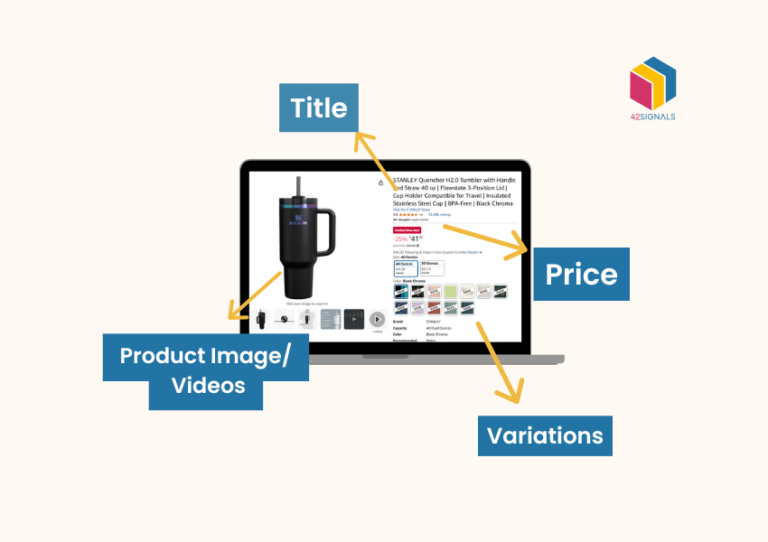In eCommerce, consumer insights are invaluable for shaping effective marketing and sales strategies. Understanding consumer behavior, preferences, and trends can empower businesses to make informed decisions, optimize their operations, and achieve their sales targets.
Let’s explore how ecommerce businesses can harness customer insights, with voice of customer analytics to drive their marketing and sales strategies.
Understanding Consumer Insights

Image Source: Medallia
Consumer insights refer to the deep understanding of customer behaviors, preferences, and motivations that businesses gain through data analysis. This data is often collected from various sources, including website analytics, social media interactions, customer reviews, and purchasing history. By analyzing this data, businesses can uncover patterns and trends that reveal what customers want and how they interact with products and brands.
Sources of Consumer Insights
1. Website Analytics
Tools like Google Analytics provide data on user behavior, such as page views, bounce rates, and conversion paths. This data helps businesses understand how visitors navigate their website and where they drop off in the sales funnel.
2. Social Media Analytics
Platforms like Facebook, Instagram, and Twitter offer analytics tools that reveal engagement metrics, audience demographics, and trending topics. These insights help businesses understand how customers perceive their brand and what content resonates with them.
3. Customer Reviews and Feedback
Online reviews and feedback provide qualitative data on customer satisfaction, pain points, and product features that are most appreciated. This information is crucial for improving products and customer service.
4. Purchase History
Analyzing purchase data helps identify buying patterns, popular products, and customer segments. This information is vital for tailoring marketing campaigns to target specific groups effectively.
5. Surveys and Polls
Direct feedback from customers through surveys and polls can provide specific insights into customer preferences, needs, and expectations.
Using Consumer Insights to Drive Marketing Strategy
Personalization
Personalization is a powerful marketing strategy that involves tailoring content and offers to individual customers based on their preferences and behavior. Customer insights enable businesses to segment their audience and create personalized experiences that resonate with each group.
• Segmenting the Audience
By analyzing consumer data, businesses can segment their audience based on demographics, purchasing behavior, and interests. This allows for targeted marketing campaigns that speak directly to the needs and desires of each segment.
• Tailoring Content
Personalized content, such as emails, product recommendations, and advertisements, can significantly increase engagement and conversion rates. For instance, using customer purchase history to recommend similar products or sending personalized emails with special offers can enhance the customer experience.
Optimizing Customer Experience

Image Source: Aim Technologies
Consumer insights can help businesses identify areas for improvement in the customer journey, leading to a more seamless and satisfying experience.
• Enhancing Website Usability
By analyzing website analytics, businesses can identify pages with high bounce rates or low conversion rates. This information helps in optimizing website design and functionality to ensure a smooth browsing experience.
• Streamlining the Checkout Process
Insights into the checkout process can reveal obstacles that cause cart abandonment. Simplifying the checkout process, offering multiple payment options, and providing clear shipping information can reduce friction and improve conversion rates.
• Improving Customer Support
Feedback from customer reviews and surveys can highlight common issues faced by customers. Addressing these issues through improved customer support and self-service options can enhance customer satisfaction and loyalty.
Crafting Effective Messaging
Understanding consumer motivations and preferences allows businesses to craft compelling messaging that resonates with their target audience.
• Aligning with Customer Values
Insights into customer values and beliefs can guide businesses in developing messaging that aligns with their audience’s priorities. For example, if a significant portion of the audience values sustainability, highlighting eco-friendly practices can strengthen brand loyalty.
• Emphasizing Unique Selling Points (USPs)
Consumer insights can reveal which product features or benefits are most valued by customers. Businesses can emphasize these USPs in their messaging to differentiate themselves from competitors and attract potential customers.
Using Consumer Insights to Drive Sales Strategy
Product Development and Innovation
Consumer insights play a crucial role in guiding product development and innovation. By understanding customer needs and preferences, businesses can create products that meet market demands.
• Identifying Market Gaps
Insights from customer feedback and market trends can reveal unmet needs and opportunities for new products. Businesses can leverage this information to develop innovative solutions that address customer pain points.
• Enhancing Product Features
Analyzing customer reviews and feedback can provide valuable insights into product features that customers love or dislike. This information can guide product improvements and updates to enhance customer satisfaction.
Pricing Strategy
Pricing is a critical factor in the purchasing decision. Customer insights can inform pricing strategies that maximize profitability while remaining competitive.
• Understanding Price Sensitivity
By analyzing purchasing behavior and feedback, businesses can gauge how sensitive customers are to price changes. This information can guide pricing decisions, such as offering discounts or adjusting prices based on demand.
• Competitive Analysis
Consumer insights can reveal how customers perceive competitors’ pricing and products. Businesses can use this information to position their products strategically and offer value propositions that set them apart.
Sales Channel Optimization
Understanding where and how customers prefer to shop can help businesses optimize their sales channels for maximum reach and convenience.
• Identifying Preferred Channels
Customer insights can reveal which channels customers prefer, such as online marketplaces, social media, or physical stores. Businesses can focus their efforts on these channels to reach their target audience effectively.
• Omnichannel Strategy
By analyzing customer interactions across different channels, businesses can develop an omnichannel strategy that provides a seamless shopping experience. This approach ensures consistency in branding and messaging, regardless of where customers choose to engage.
Conclusion
Consumer insights empower businesses to make data-driven decisions that enhance customer satisfaction, increase engagement, and ultimately drive sales growth.
It’s such an integral part of creating a well-developed product line that has a large and loyal customer base.







